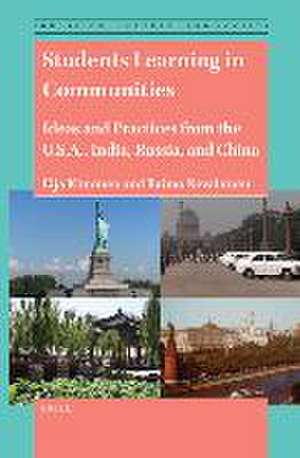Students Learning in Communities: Ideas and Practices from the U.S.A., India, Russia, and China: Education, Culture, and Society, cartea 4
Autor Eija Kimonen, Raimo Nevalainenen Limba Engleză Paperback – 6 apr 2022
The authors offer a comprehensive picture of community-based learning in education and demonstrate how teachers can make learning more functional and holistic so that students can work in new situations within their complex worlds. School-specific descriptions reveal how teachers and students implemented community-based projects at different times.
Preț: 282.82 lei
Nou
Puncte Express: 424
Preț estimativ în valută:
54.12€ • 56.30$ • 44.68£
54.12€ • 56.30$ • 44.68£
Carte indisponibilă temporar
Doresc să fiu notificat când acest titlu va fi disponibil:
Se trimite...
Preluare comenzi: 021 569.72.76
Specificații
ISBN-13: 9789004517769
ISBN-10: 9004517766
Dimensiuni: 155 x 235 mm
Greutate: 0 kg
Editura: Brill
Colecția Brill
Seria Education, Culture, and Society
ISBN-10: 9004517766
Dimensiuni: 155 x 235 mm
Greutate: 0 kg
Editura: Brill
Colecția Brill
Seria Education, Culture, and Society
Notă biografică
Eija Kimonen, Ph.D. (2011), University of Jyväskylä, is Senior Researcher in the RICEI Project at that university. She has coedited and published books on reform pedagogics in the U.S.A., India, and China, including Education and Society in Comparative Context (Sense Publishers, 2015) and Toward Community-Based Learning (Brill Sense, 2020).
Raimo Nevalainen, Ph.Lic. (1995), University of Jyväskylä, is Researcher in the RICEI Project at that university. He has coedited books on teacher education, including Transforming Teachers’ Work Globally (Sense Publishers, 2013) and Reforming Teaching and Teacher Education (Sense Publishers, 2017).
Raimo Nevalainen, Ph.Lic. (1995), University of Jyväskylä, is Researcher in the RICEI Project at that university. He has coedited books on teacher education, including Transforming Teachers’ Work Globally (Sense Publishers, 2013) and Reforming Teaching and Teacher Education (Sense Publishers, 2017).
Cuprins
Preface
1 Introduction
1 Pedagogical Approaches to Community -Based Learning
2 Traditions of Educational Aims
3 Aims and Their Value Dimensions
4 Continuity and Fundamental Change in Education
5 Educational Reforms in a Changing Social Context
6 Dimensions of School Culture
7 Key Features of the Learning Environments
8 Society and Education
9 Historical-Hermeneutic Comparative Education
2 Ideals for Learning in Communities in the United States of America
1 Philosophical Views
2 Essentialism and American Educational Reform
3 Revival of Conservatism in American Education
4 Community-Based Pedagogical Ideas in the United States
3 Ideals for Learning in Communities in the Republic of India
1 Philosophical Views
2 Indian Modernization and Educational Reform
3 Resistance to Educational Change in India
4 Community-Based Pedagogical Ideas in India
4 Ideals for Learning in Communities in the Russian Empire
1 Philosophical Views
2 Community-Based Pedagogical Ideas in the Russian Empire
5 Ideals for Learning in Communities in the Soviet Union
1 The Narkompros Years
2 Joseph Stalin and the Totalitarian System
3 Nikita Khrushchev and Educational Reform
4 Leonid Brezhnev and Modernization-Inclined Ideas
5 Yuri Andropov, Konstantin Chernenko, and the Brezhnevian Policies
6 Mikhail Gorbachev Reforms with Perestroika and Glasnost
7 Community-Based Pedagogical Ideas in the Soviet Union
6 Ideals for Learning in Communities in the Russian Federation
1 Implications under Boris Yeltsin
2 Implications under Vladimir Putin
3 Community-Based Pedagogical Ideas in the Russian Federation
7 Ideals for Learning in Communities in the People’s Republic of China
1 Philosophical Views
2 Chinese Modernization and Its Educational Reforms
3 Borrowing Educational Ideas in China
4 Community-Based Pedagogical Ideas in China
8 Conclusions
1 Implications of Centralized and Decentralized School Systems
2 Future Reforms, Challenges, New Pedagogics and Views
Afterword
References
Index
1 Introduction
1 Pedagogical Approaches to Community -Based Learning
2 Traditions of Educational Aims
3 Aims and Their Value Dimensions
4 Continuity and Fundamental Change in Education
5 Educational Reforms in a Changing Social Context
6 Dimensions of School Culture
7 Key Features of the Learning Environments
8 Society and Education
9 Historical-Hermeneutic Comparative Education
2 Ideals for Learning in Communities in the United States of America
1 Philosophical Views
2 Essentialism and American Educational Reform
3 Revival of Conservatism in American Education
4 Community-Based Pedagogical Ideas in the United States
3 Ideals for Learning in Communities in the Republic of India
1 Philosophical Views
2 Indian Modernization and Educational Reform
3 Resistance to Educational Change in India
4 Community-Based Pedagogical Ideas in India
4 Ideals for Learning in Communities in the Russian Empire
1 Philosophical Views
2 Community-Based Pedagogical Ideas in the Russian Empire
5 Ideals for Learning in Communities in the Soviet Union
1 The Narkompros Years
2 Joseph Stalin and the Totalitarian System
3 Nikita Khrushchev and Educational Reform
4 Leonid Brezhnev and Modernization-Inclined Ideas
5 Yuri Andropov, Konstantin Chernenko, and the Brezhnevian Policies
6 Mikhail Gorbachev Reforms with Perestroika and Glasnost
7 Community-Based Pedagogical Ideas in the Soviet Union
6 Ideals for Learning in Communities in the Russian Federation
1 Implications under Boris Yeltsin
2 Implications under Vladimir Putin
3 Community-Based Pedagogical Ideas in the Russian Federation
7 Ideals for Learning in Communities in the People’s Republic of China
1 Philosophical Views
2 Chinese Modernization and Its Educational Reforms
3 Borrowing Educational Ideas in China
4 Community-Based Pedagogical Ideas in China
8 Conclusions
1 Implications of Centralized and Decentralized School Systems
2 Future Reforms, Challenges, New Pedagogics and Views
Afterword
References
Index





